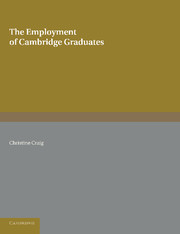Foreword
Published online by Cambridge University Press: 05 June 2016
Summary
The University Appointments Boards exist to give advice and information about careers to Cambridge men and women and to act as a link between undergraduates and employers. It is therefore essential that the Boards' officers should know something of what has happened to students after they have started work in their various callings and professions.
In the period immediately preceding the Second World War the men's Board made plans for a ‘follow-up’ survey for this purpose. But before it could be carried out the war intervened and interrupted the careers of those who might have contributed relevant information. The original plans had to be drastically modified, but a different study was made which is embodied in the publication ‘University Education and Business’ issued in 1946.
In the post-war years the Boards were able to elicit piecemeal information from employers and from graduates about the progress of Cambridge recruits in many occupations. But the Boards felt that it would be desirable to arrange for a more systematic survey of what has actually happened to undergraduates who left the University some years ago. Hence the present survey. The Boards have not supervised the project in detail, but have given their approval to the general lines on which it has been conducted.
It cannot, of course, be assumed either that a survey of a different cross-section of undergraduates (i.e. those who left the University at times different from those covered by the survey) would necessarily show the same pattern or that the pattern of the past will necessarily be reproduced in the future. But the outcome of the survey should enable the Boards' officers—and indeed Tutors and other teaching officers who advise undergraduates—to assess new developments more effectively.
The aim of the survey was primarily to help the Appointments Boards in Cambridge If a study had been made of the careers followed by men and women of the same years in other Universities, the findings would not necessarily have been similar. But, if due allowances are made for this factor, the report will, we hope, be of wide interest both to those who educate young people of high intelligence and to those who may employ them.
- Type
- Chapter
- Information
- The Employment of Cambridge Graduates , pp. v - viPublisher: Cambridge University PressPrint publication year: 2013

